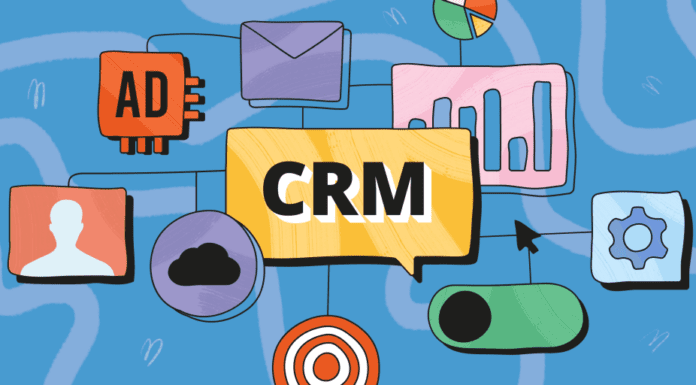CRM software is now the world’s largest software market. There is every justification for this, as businesses compete for clients. In this article, we will discuss the five types of CRM software you should be aware of and if you would like to develop the CRM for your business; then how to select the best CRM development company for your business.
When you consider how crucial information has become in the digital age, it becomes clear. Companies of all sizes strive to make the most of the information they already have on their customers and prospects. Custom CRM systems help them achieve this goal, which leads to better customer service and more money in their pockets.
If you’re just getting started with CRM tools, I’d like to explain some fundamentals first. You cannot skip these if you want to learn about the many types of CRM software.
What exactly is CRM software?
Customer relationship management (CRM) software is a way to store and organize information about your customers. CRM can keep track of contact information, purchase history, service issues that have been reported, open questions, sales prospects, and even marketing campaigns.
If you have users or clients, having a personalized CRM is the way to go, regardless of industry or company size. It results in better customer service, a better understanding of the relationships between customers and prospects, better lead management, and finally, more closed deals. Which person wouldn’t desire that?
The benefit of this solution is that it is available in a variety of formats. You can select the right tool for you depending on how big your firm is and how much money you’re willing to invest.
CRM Software Types You Should Be Aware Of
This article doesn’t talk about custom CRM development services, which let you make your own, completely unique app. Instead, I’d like to discuss the many forms of CRM in general, so you know what’s available.
To summarize, there are five distinct types of CRM software
- Operational: This category enables you to better run your business based on consumer data.
- Analytical CRM: It lets you see how your data looks, which gives you a better understanding of your customers, how they interact with your business, and the possibilities.
- Collaborative: The emphasis here is on how you can communicate with your vendors and distributors based on shared consumer data.
- Campaign Management: It is a mix of analytical and operational CRMs. It is used to run sales or marketing campaigns based on contact information found in the system.
- Strategic: This type prioritizes customers, allowing you to use consumer and market knowledge to make better business decisions.
Let’s take a closer look at each of them now.
1. CRMs for Operations
Operational CRMs help your marketing, sales, and customer service teams serve both current and potential customers better.
Because the tool lets you organize information about your contacts and define common processes, it can be used to automate things like:
- Marketing automation
- Sales automation
- Service Automation
This lets different parts of your company work together to find, nurture, and close deals.
Operational CRM includes: Hubspot and Salesforce are two excellent and well-known examples of operational CRM platforms.
2. CRMs with analytic capabilities
Analytical CRMs assist businesses in making better use of consumer information. Customer preferences, channels, points of contact, interests, and other factors can all be included.
Analytical CRMs, for example, help you understand your customers by putting them in the sales funnel.
Then, based on the contact data, data mining components can gather even more information, such as trends, and assist in recognizing patterns in data sets. Companies may use the data they already collect in this manner to make better business decisions.
3. Collaborative CRMs
Collaborative CRMs enable multiple teams inside your organization to exchange customer information. Most operational CRMs focus on marketing and sales, but in this case, customer service is the main focus.
With collaborative CRMs, you can improve information exchange between departments like sales and marketing, as well as support teams. These departments frequently operate independently, making it more difficult to respond to client inquiries. Managing customer connections is simplified with collaborative CRMs.
4. Campaign management CRMs
Campaign management CRMs are frequently classified as analytical or operational CRMs. This is because they have all the features that make it possible to use customer data and insights to run marketing and sales campaigns. But this type of CRM solution needs to be kept separate if you want to use contact information to plan, manage, and analyze better campaigns.
Popular systems connect to email campaign providers like Mailchimp or Outreach, which makes it easy to run campaigns from a CRM. This is something I discussed in the operational CRMs section of this essay.
5. Strategic Customer Relationship Management
Strategic CRM, which is sometimes part of the idea of “collaborative CRMs,” is centered on the customer. In this case, gathering information on clients and their interactions with your company may lead to a better relationship with them.
This sort of CRM is known as strategic. It not only provides immediate information but also modifies or customizes the way you connect with clients in the long run. This is a good plan if your business values long-term relationships over quick sales and short promotions.
How to choose a CRM for your business?
As you can see, specific CRMs can be found in the same tools, such as Hubspot, Salesforce, or Zoho. Because these examples provide unique strategies for various reasons, it is important to understand what type of CRM you require in order to make the best choice.
If you’re having trouble deciding on a CRM, define your business goals:
- Would you like to automate your marketing and sales processes?
- Are you seeking ways to better understand your customers?
- How do you want your company’s departments to work together?
- Do you prioritize long-term customer relationships?
Based on the answers to these questions, you can choose what features your desired custom CRM should have based on the answers to these questions.
Investing in custom CRM development services is another possibility. It’s your own CRM, built solely around your company’s needs and goals.
Again, consider how you want to handle your clients and prospects. Then, examine out-of-the-box alternatives to see if they meet your requirements.


